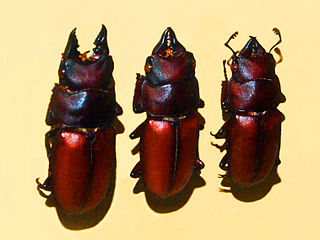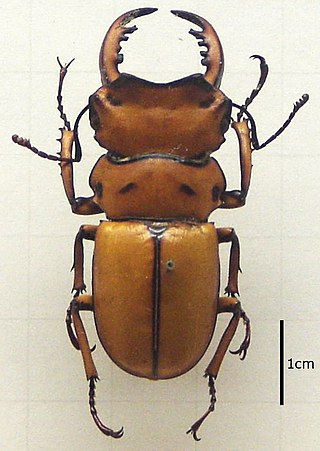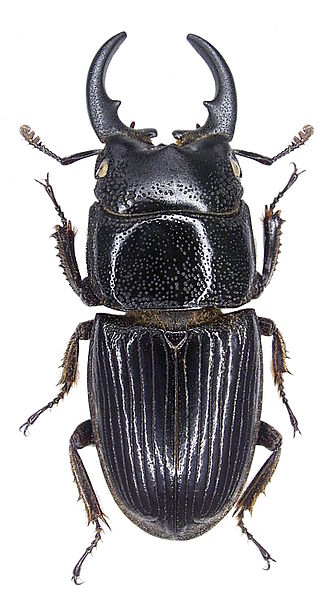
Temnodontosaurus is an extinct genus of ichthyosaur from the Early Jurassic period. They lived between 200 and 175 million years ago (Hettangian-Toarcian) in what is now Western Europe and possibly other countries including Switzerland and Chile. It lived in the deeper areas of the open ocean. University of Bristol paleontologist Jeremy Martin described the genus Temnodontosaurus as "one of the most ecologically disparate genera of ichthyosaurs," although the number of valid Temnodontosaurus species has varied over the years.

Dorcus is a genus of beetles in the stag beetle family Lucanidae. Of the over 100 species, most occur in Asia and India; two are found in southern Europe, and two species are from North America. Previously, specimens with serriform teeth on the mandibles and sable pigment were called Serrognathus whereas specimens with but a singular or multiple bulky notches on the mandibles and lustrous sable pigmentation were called Dorcus.

The Lucaninae comprise the largest subfamily of the stag beetles (Lucanidae).

Lucanus is a genus of stag beetles (Lucanidae).

Odontolabis cuvera, the golden stag beetle, is a beetle of the family Lucanidae, stag beetles.
The Lucanidae are a family of beetles that include the stag beetles. The family can be further subdivided in a taxonomy. The classification presented here follows Smith (2006), with the exception of the tribal classification within the Lucaninae.

Chiasognathus is a genus of stag beetles found in Argentina and Chile. It includes seven species:
Jean-Pierre Lacroix (1938–1989) was a French entomologist.

Cyclommatus is a genus of the family Lucanidae, also known as the stag beetle. The majority of the species from the genus Cyclommatus are located in Southeast Asia, though some species are found in China and Taiwan as well. The genus Cyclommatus also consists of three subgenera: Cyclommatus, Cyclommatinus and Cyclommatellus. Each subgenera contains 80, 24 and 3 species respectively. In total, the genus Cyclommatus consists of a total of 134 species, though more are still being discovered to this day.

Hexarthrius parryi, the fighting giant stag beetle, is a species of large stag beetles. It belongs to the genus Hexarthrius of the tribe Lucanini. It is classified under the subfamily Lucaninae of the stag beetle family Lucanidae.

Hexarthrius is a genus of large stag beetles. They are also known as fork horned stag beetles for the shape for their mandibles It includes the following species:

Odontolabis is a genus of beetles belonging to the family Lucanidae.

Prosopocoilus is a genus of beetles of the family Lucanidae.

Leptinopterus is a genus of beetles belonging to the family Lucanidae.

Homoderus mellyi is a species of stag beetle in the family Lucanidae.
Figulus incertus is a species of stag beetle.

Prosopocoilus buddha is a species of stag beetle in the tribe Cladognathini. This Asian species is variable, with several known subspecies and widely distributed from India to Sulawesi.

Aegus chelifer, is a species of stag beetle found in Indo-Malaya regional countries.

Aegus is a genus of stag beetles in the family Lucanidae. Comprising about 260 species in the genus, they are placed in the largest subfamily Lucaninae. They are distributed in South Asia, Southeast Asia and the Pacific countries, but introduced accidentally to many parts of the islands.















